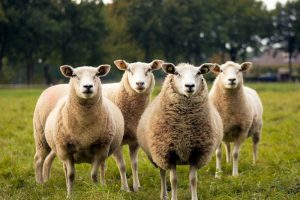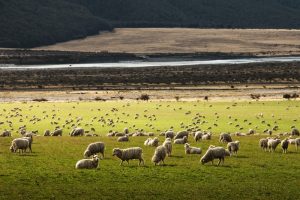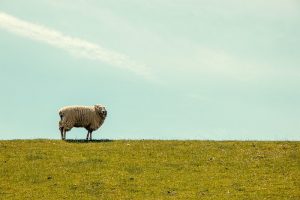Do Sheep Get Lonely?
Sheep are small low-maintenance livestock that can be a great investment for farmers and hobbyists alike. If you’re looking to buy a sheep for a pet, you may be wondering whether you need to get your sheep a companion or not. If you’re a sheep farmer and have a sheep that has been injured, you may be wondering whether you should separate the sheep from the rest of the flock. To properly care for your sheep, it’s important to understand their social needs.
Can you keep a sheep by itself? You should not keep a sheep by itself or isolated from other sheep or animals. Sheep are prey and herd animals; their nature and instinct are to be in a flock for comfort and safety. Your sheep can experience stress and loneliness if separated from their flock or kept by themselves.
Understanding the natural instincts of your sheep will help you know how to better care for them and understand their behaviors. To learn more about how to care for your sheep and provide adequate companionship for them, keep reading.
Does a Sheep Need a Companion? What You Need to Know
For their mental and physical well-being, sheep need companions. Here are some things to consider when it comes to arranging living situations for your sheep:
Sheep Are Prey and Herd Animals
First and foremost, sheep are prey animals. This status determines all of their instincts, behaviors, and even anatomical design. Sheep’s eyes are set on the side of their heads, providing them with monocular vision. This enables them to see almost 360 ° around them. The hooves on a sheep enable them to leap and run quickly away from danger. Sheep have larger ears that stick out from their head and swivel back and forth, capturing sounds from all around.
Prey animals are flight animals. This means they rather run and flee from danger rather than standing their ground to fight. As prey animals, sheep will flee at the first sign of danger. This means they can be rather jumpy in environments they aren’t familiar with.
Rarely do prey animals remain solitary and wander alone, as this makes them more susceptible to predators. Prey animals usually stay in a herd where they are stronger in numbers and have more ears to listen for danger. Prey animals feel safer in a herd. When removed from a group setting, your sheep can feel more vulnerable to danger and suffer from stress and anxiety.
This is the main reason it is highly recommended to keep sheep together or at least put them in with over livestock. Sheep can experience negative health conditions caused by stress and anxiety when separated from their flock or companions. For your sheep’s well-being, you should provide a herd setting for them.
How Many Sheep Should I Get?
 Now that you know that you shouldn’t keep sheep alone, you may be wondering how many sheep you need to get. It’s recommended that you get at least five sheep to provide a proper flock setting. This number of sheep will provide comfort for each other and an atmosphere of safety.
Now that you know that you shouldn’t keep sheep alone, you may be wondering how many sheep you need to get. It’s recommended that you get at least five sheep to provide a proper flock setting. This number of sheep will provide comfort for each other and an atmosphere of safety.
Before you purchase your sheep, you’ll need to make sure you have adequate resources. Your biggest resource will be land; one acre of land can usually sustain two sheep. That means if you plan on having five sheep, you should at least have 2.5 acres. Keep in mind, that field rotation and resting the land is important for quality forage production, so you should add a few extra acres to properly care for your sheep.
You’ll also want to make sure you have the finances to purchase the amount of sheep you need. A flock of producing ewes will be more expensive than buying a group of lambs. Sheep can cost anywhere from $100 – $250, so you should expect to pay $500 – $1200 for five sheep.
Can I Keep My Sheep With Other Livestock?
You can keep sheep with other livestock, preferably goats or alpacas. Goats and alpacas are also herd animals, so they can bond with the sheep as a herd. They’re also smaller in size than most livestock, so the sheep won’t run the risk of getting underfoot, as they would with cattle or horses.
Keeping your sheep with goats can increase your pasture utilization; Pasture utilization means getting the most out of your land. Sheep and goat diets vary, while sheep prefer grass and goats prefer bushes, weeds, and rougher forage. If you have a pasture of varying forage, this combination of livestock can enable you to get the most out of your forage.
Another great animal combination to increase pasture utilization are pigs and chickens. To learn more, check out my article Can Pigs and Chickens Live Together?
How to Care For Your Flock of Sheep
Since purchasing sheep means your gaining at least five more lives to care for, it’s important to know the care requirements for both the single sheep and the flock as a whole. Here are some things to consider:
Sheep Should Rely Mostly On Pasture Forage for Food
Sheep require a diet of mostly grass. Sheep are grazers and will spend the majority of their day eating down your pasture. As mentioned above, one acre can usually support two sheep, so you’ll want at least 2.5 acres for five sheep. You can supplement your flock’s diet with hay and grain. Sheep eat about 3% of their body weight a day, so if you have five sheep, that can mean your flock of five sheep is consuming at least 22 lbs (10 kg) of forage and food a day.
Make Sure Your Flock Has Access to Fresh Water
On average, one sheep consumes 3 gallons of water (11 L) per day. This means that a flock of five sheep can consume at least 15 gallons (56 L) per day. You’ll need to ensure that your sheep have access to plenty of fresh water. In the cold months, use water heaters to keep water from freezing, as this can lead to dehydration in your sheep.
Perform Routine Health Maintenance of Your Sheep
 Sheep require routine health maintenance to ensure they stay healthy and strong. Some of the regular health care you’ll have to perform on your sheep includes deworming, hoof trimming, shearing, and giving vaccinations. You should deworm your flock at least once a month, as sheep are known to be susceptible to worms and parasites.
Sheep require routine health maintenance to ensure they stay healthy and strong. Some of the regular health care you’ll have to perform on your sheep includes deworming, hoof trimming, shearing, and giving vaccinations. You should deworm your flock at least once a month, as sheep are known to be susceptible to worms and parasites.
A sheep will need its hooves trimmed about every eight weeks. Sheep hooves are much like human fingernails; the hooves are made from keratin and are continuously growing. If sheep’s hooves get too long, they can make it difficult and uncomfortable to walk on.
While many people shear their sheep to sell the wool, shearing is also a requirement to uphold your sheep’s health. Sheep cannot shed their wool and the coat will continue to grow. The wool can trap dirt, debris, and moisture, causing infections and bad hygiene. Lastly, wool left on your sheep during the warmer months can cause your sheep to overheat. Sheep are usually sheared once a year in springtime to prepare them for the warmer months and give them time to grow their wool back before winter.
Sheep will need to be vaccinated annually for clostridial C and D and tetanus. Vaccinating your sheep can protect your entire flock and keep them safe from disease and infection.
Provide Shelter For Your Sheep
While sheep are relatively low-maintenance and are known to be tolerant of the cold, they still require shelter from the elements. Your flock should have a barn, run-in shed, or tree cover they can escape to during bad weather or the heat of a hot day. If your sheep don’t have shelter during rain and snow, they can become more susceptible to moisture being held in their coat, causing bacterial infections and possibly hypothermia.
You can also provide your sheep with bedding in their shelter to provide comfort. Straw provides a soft ground layer for your sheep to lay down and rest on. Sheep sleep about four hours a day, and will often huddle together and sleep in shelters where they feel safe and comfortable.
Want to know more about how rain may affect your sheep? You can learn more by reading my article Leaving Sheep Out in the Rain: Everything You Need to Know.
Your Flock Will Need a Guardian
Since sheep are prey animals, you’ll want to get a livestock guardian to watch over them. Left alone, your flock can be susceptible to attacks from wild dogs, coyotes, bobcats, and other small livestock predators. A livestock guardian is an animal known to fight off predators and protect the flock. The best livestock guardians for sheep are donkeys, as these animals can live out with the sheep and they require little maintenance.
You can learn more about livestock guardian animals by reading my article What Are the Best Livestock Guardian Animals?
A flock of sheep can be a great addition to your farm or homestead. While they require companions, sheep can be profitable in many ways, from wool and reproduction to meat and milk. Many people even purchase them as cute barnyard pets! Either way, I hope this article was helpful to you in learning the social demands your sheep may have. To learn more about livestock and poultry, you can view more of my articles here.


